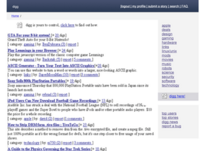This is an old revision of this page, as edited by 86.128.226.210 (talk) at 01:27, 2 May 2007 (→Criticism). The present address (URL) is a permanent link to this revision, which may differ significantly from the current revision.
Revision as of 01:27, 2 May 2007 by 86.128.226.210 (talk) (→Criticism)(diff) ← Previous revision | Latest revision (diff) | Newer revision → (diff) "Diggit" redirects here. For the television series, see Diggit (TV series).| Digg logo | |
| Digg main pageDigg main page as of May 1st, 2006 | |
| Type of site | Social content website |
|---|---|
| Owner | Digg, Inc. |
| Created by | Kevin Rose |
| Employees | 18 |
| URL | http://www.digg.com/ |
| Commercial | Yes |
| Registration | Free |
Digg is a community-based popularity website with an emphasis on technology and science articles, recently expanding to a broader range of categories such as politics and entertainment. It combines social bookmarking, blogging, and syndication with a form of non-hierarchical, democratic editorial control.
News stories and websites are submitted by users, and then promoted to the front page through a user-based ranking system. This differs from the hierarchical editorial system that many other news sites employ.
History
Digg started out as an experiment in November 2004 by Kevin Rose, Owen Byrne, Ron Gorodetzky, and Jay Adelson (who serves as CEO), all of whom currently play an active role in the management of the site.

"We started working on developing the site back in October 2004," Kevin Rose told ZDNet "We started toying around with the idea a couple of months prior to that, but it was early October when we actually started creating what would become the beta version of digg. The site launched to the world on December 5th 2004."
Kevin Rose's friend David Prager (The Screen Savers, This Week in Tech) originally wanted to call the site “Diggnation”, but Kevin wanted a simpler name. He chose the name "Digg", because users are able to "dig" stories, out of those submitted, up to the front page. The site was called “Digg” instead of “Dig” because the domain name “dig.com” was previously registered. “Diggnation” would eventually be used as the title of Kevin Rose and Alex Albrecht's weekly podcast.
The original design was free of advertisements, and was designed by Dan Ries. As Digg became more popular, Google AdSense was added to the website. In July 2005, the site was updated to "Version 2.0". The new "version" featured a friends list, the ability to "digg" a story without being redirected to a "success" page, and a new interface designed by web design company Silverorange . The site developers have stated that in future versions a more minimalist design will likely be employed. On Monday June 26, 2006 version 3 of Digg was released with specific categories for Technology, Science, World & Business, Videos, Entertainment and Gaming as well as a View All section where all categories are merged.
Digg has grown large enough that submissions sometimes create a sudden increase of traffic to the "dugg" website. This is referred to by some Digg users as the "Digg effect" and by some others as the site being "dugg to death". However, in many cases stories are linked simultaneously on several popular bookmarking sites. In such cases, the impact of the "digg effect" is difficult to isolate and assess.
Functionality
Readers can view all of the stories that have been submitted by fellow users in the "digg/News/Upcoming" section of the site. Once a story has received enough "diggs", it appears on Digg's front page. Should the story not receive enough diggs, or if enough users report a problem with the submission, the story will remain in the "digg all" area, where it may eventually be removed.
Articles are short summaries of stories on other websites with links to the stories, and provisions for readers to comment on the story. All content and access to the site is free, but registration is compulsory for certain elements, such as promoting ("digging") stories, submitting stories and commenting on stories. Digg also allows for stories to be posted to a user's blog automatically when he or she diggs a story.
Originally, stories could be submitted in fifteen different categories which include: deals, gaming, links, mods, music, robots, security, technology, Apple, design, hardware, Linux/Unix, movies, programming, science and software. With the release of Digg 3.0 on June 26, 2006, the categories became divided into 6 containers: Technology, Science, World & Business, Sports, Entertainment, Gaming, with sub-categories.
gtfo
See also
References
- MacManus, Richard (2006-02-01). "Interview with Digg founder Kevin Rose, Part 1". ZDNet. Retrieved 2006-07-15.